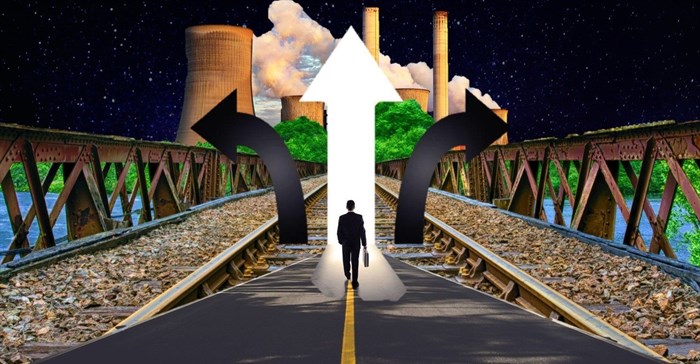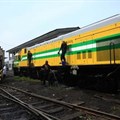
Subscribe & Follow
#AfricaMonth
In the news
When the going gets tough, the tough get railing

To place this in perspective, it is estimated that only 5% of the total freight moved in Zambia occurs via rail, the remaining 95% is transported by road.
The announcement came as a shock to many, with much criticism on the practical execution.
The Zambian Chamber of Mines was among the most vocal critics, re-affirmed by the concerns of many other bulk traders, calling the move “retrogressive” and “unworkable”. Given that Zambia is largely a commodity-driven economy, the 'penalty' on bulk commodities is considered contrarian to growth.
Furthermore, the Chamber’s negative assertions about the bill were based on notions that Zambia’s rail infrastructure is sub-par, inaccessible, unreliable, unscheduled and, therefore, is unfit to absorb a greater market share of the freight transportation volumes.
With innovation and growth, many industries have moved away from traditional “old-school” ways of work.
Many do not view rail in a good light
Rail is definitely one of the oldest modes around, and many do not view it in a good light. We need convenience, instant 'on-demand' offerings with quick turnarounds. These 'needs' have fuelled (excuse the pun) the growth of road freight to the detriment of rail over the years, with a self-fulfilling prophecy.
As more freight opted for road, systematically rail freight reduced. With this conversion, lower utilisation of rail networks led to lower income and rail operators (mostly government-owned and operated) were unable to reinvest, rehabilitate or enhance networks in many instances (amongst other excuses)
African governments have recognised the economic importance of efficient railway networks for bulk volumes, especially along value corridors. This has seen an increase in private concessions, operators and pressure on state-owned rail entities coming into play.
Similar to Europe and America, this means competition, which should create price and service improvements. (Recommend reading Architects of Poverty: Why Africa’s Capitalism needs Changing by Moeletsi Mbeki).
The benefits of rail freight transport are vast:
1. Congestion
- Less congested roads positively influence productivity and economic output of a country. Most African cities feel the strain of high road congestion; taking hundreds of trucks off the road makes sense.
- In America, road congestion costs the economy ±$78bn per annum in wasted travel time (4.2 billion hours) and wasted fuel (2.9 billion gallons / 10.9 billion litres).
2. Road maintenance
- As per WSP Environmental Consultants, road damage by heavy trucks are estimated at $99c/tkm
- The Zambian government is said to save ±$71m annual damages with the shift to rail – maybe they could rather spend this on conservation efforts?
3. Fuel cost
- With fuel being such a burdensome expense and oil price instability, it is comforting to note that rail is at least three times more fuel efficient than trucks. Ideally, this cost-saving will be passed onto everyday consumers, reducing inflation pressure?
- By way of a case study undertaken by EmptyTrips’s business development manager, Justine Letard: A South African SME client who transports 3600 tonnes of packaging materials between Johannesburg and Lusaka would save a staggering R1.7m ($130k) per annum. Cargo will arrive in 14 days, vs 11 days by road. Do the three days really matter for packaging materials?
4. Health and safety
- Trucks unanimously increase the death-toll on roads. A study completed by North West Rail estimated that ± 1200 deaths could be avoided per annum in Zambia. The number of animal deaths has not been estimated (sadly).
- Given promiscuous behaviour by certain truckers, it is estimated that ±14400 HIV infections could be avoided per year in Zambia! (±43445 in South Africa!) Once again, government “healthcare” budgets for ARV’s could be reallocated to conservation!

5. The environment
- Lastly, and most importantly, the impact on our environment. Whilst the exact number may be up for debate, it is unanimously agreed that the greenhouse gas emissions of rail freight are far lower than road freight. Some studies show rail emits up to ±75% less greenhouse gases per tonne of freight.
- In North America, if 1% of long-haul road freight were moved by rail instead, ±110 million gallons (±416 million litres) of fuel will be saved, and greenhouse gas emissions would be reduced by ±1.2%.
Given that we can't stop the mining for "value" (i.e. the resource prostitution of our African continent), we should enable, mandate, and accelerate a lighter footprint of these activities urgently...In Zambia, the shift to rail would reduce ±870 000 tonnes of CO2 annually, that equates to a 76,000 hectare forest.
As such, the Zambian legislature earns an applause for the “contrarian move”. It is one small step for man, but one giant leap for Zambia in my opinion.
Yet, a change in the mode of engagement is needed to materialise the 30% conversion target. Rail needs a rebrand, a refresh, and a new approach to increase utilization to have its “come-back”. In Zambia, and globally.
But how?
To find the solution, one should simply do the opposite of what has been done to cause the problem: replace opaqueness with transparency, high barriers to entry with ease of access, reduce rates to attract freight, and simplify it all with instant accessible automated booking systems, whilst providing better client service.
The old, manual, arduous manner with opaque (uncompetitive) pricing methods, and limited scheduled trains is not viable.
This mirage of frustration leads to a large contribution of the unused capacity (empties), where it is estimated that the average wagon in a typical rail network moves 45% of its gross distances empty, and the “default” of booking freight by road. Simply unacceptable.
(P.S. Road will always be critical to success, and needed, given rail accessibility constraints - they complement one another... case is for more optimal long-haul heavy freight by rail.)
Maybe a smart algorithmic-enabled digital marketplace platform that can help match cargo, predict volumes, schedule trains, provide market-related transparent pricing, market excess wagon capacity, whilst providing instant easy freight bookings could be part of rail’s refresh?
A portal that enables inter-modal complementarity - like Expedia but for freight? How smart would that be?
There is a general trend of “going back to simpler times”, where the old ways of doing things are the better way of doing things. Be it artisanal beer brewed at home, or handmade knitted blankets. Sometimes old-school is best, especially if we give it some flair.
In summary, to quote a friend, “What is the difference between a squirrel and a rat? Marketing.”
So, let’s refresh rail, and “market” it great again, so the tough can get railing, and the rail can get moving.
All on board?

About Benji Coetzee
Benji Coetzee is the founder and chief executive officer of EmptyTrips, an online transport marketplace leveraging algorithms and competitive online auctions to better match demand and supply of cargo transport in Africa, reducing costs and carbon emissions. Coetzee has nearly a decade experience in top-tier management consulting, banking and insurance (The Boston Consulting Group, World Economic Forum and HSBC Africa).Related
Rethinking welding techniques can revolutionise sustainability 20 Feb 2025 Thungela sees coal output jump as rail performance improves 10 Dec 2024 Fleet telematics evolution must be holistic 26 Nov 2024 Tech lightens the load of high-risk road transport 21 Nov 2024 Addressing SA's environmental challenges: Freight industry solutions for a greener future 19 Aug 2024 Logistics sector sees May recovery amidst slower growth 5 Jul 2024













